In the lead-up to the 2019 Hugo Awards, we’re taking time to appreciate this year’s novel, young adult, and short fiction Finalists, and what makes each of them great.
Each this year’s Hugo finalists for Best Short Story—from authors Brooke Bolander, P. Djèlí Clark, Sarah Gailey, Alix E. Harrow, T. Kingfisher, and Sarah Pinsker—cleverly plays with and pushes at the boundaries of genre. Whether delving into the real (and sometimes horrific) consequences of magic, gender-bending the sword-and-sorcery stock hero, balancing a fantastical alt-history with hidden historical realities, experimenting with form to deliver a uniquely layered commentary, literalizing the escapist nature of fantasy, or dropping a pack of raptors into a traditional fairy tale, these stories build on what has come before to create styles entirely new and unexpected.
“The Court Magician”—Sarah Pinsker (Lightspeed)
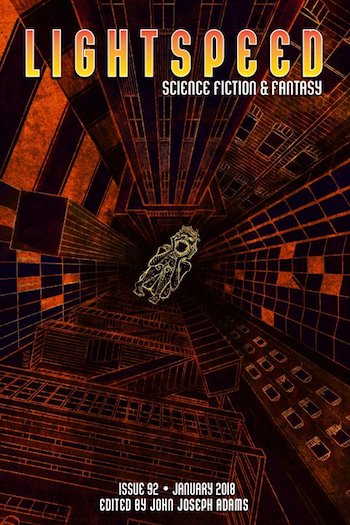
A boy wants to learn magic. He’s hungry, and rises high enough to be given the chance at Court Magician. He’s given the chance to turn away from the price of true magic, but embraces it. And once he knows the secret to true magic, he begins to lose himself. Literally.
Pinsker’s short story, “The Court Magician,” is a Hugo nominee for many reasons. It’s a story about magic and power, and the true price of wielding either. It’s a story of what happens when you pursue power, and the sacrifices—intended and unintended—that come with it. It’s about what happens when you don’t ask questions and blindly follow the whims of others instead of searching for your own answers. And it’s about breaking that cycle of sacrifice and shame and power, and pushing yourself to break the cast-iron mold you’ve poured your life into. In many ways, this is horror draped in fantasy; many writers wonder if magic systems should incur sacrifice, a thing to be given up to make reality obey you. And here, in the trappings of fantasy but with very real, terrifying consequences, Pinsker shows you just what might be asked of you: your body, your memories, your mind, your whole world. For this reason, it’s a success of a story and more of a fable than anything, as Pinsker works to teach the ultimate lesson: if you pursue power for power’s sake, if you give up everything to even hold it, it doesn’t matter what your intention for it is: ultimately, the pursuit of such power will swallow your world whole, and you must break away from it before it’s gone.
–Marty Cahill
“The Rose MacGregor Drinking and Admiration Society”—T. Kingfisher (Uncanny Magazine)
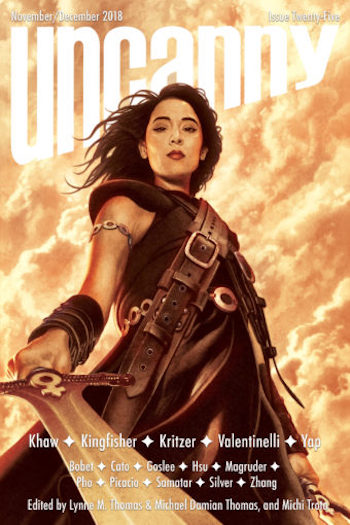
This story is good for a warm and hearty laugh, told from perspective of a bunch of fae-type male-shaped beings who all had the misfortune (to their minds) of running into the fair Rose MacGregor, a woman of many curves and captivating dimples. The society get together once a year to drown their sorrows over having been thrown over by the wily lass, who bedded each and every one of them with gusto, but was distinctly unbothered when they all, in turn, tried to leave her pining. It would seem that the lovely Rose had better things to do than worry over all the men who desperately wanted to break her heart. An enjoyable script-flip on the usual story of a virile hero who beds a young naive maiden—or many—and leaves her to wallow in shame and anguish (and perhaps even die from heartbreak), T. Kingfisher offers readers a heroine who knows precisely what she wants in a man, and how to get it over and over without those fussy entanglements and the needless drama that often ensues from a bit of good, sweaty fun. A toast to Rose MacGregor!
–Emmet Asher-Perrin
“The Secret Lives of the Nine Negro Teeth of George Washington”—P. Djèlí Clark (Fireside Magazine)
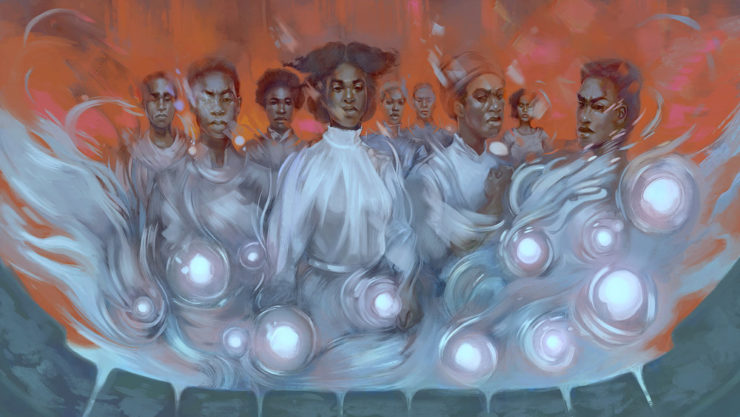
“The Secret Lives of the Nine Negro Teeth of George Washington” takes the form of a list, nine vignettes that explore a supernatural alternate-historical United States while simultaneously illustrating the realities of chattel slavery and the Transatlantic slave trade in the budding nation. It’s a clever, lyric, and thoughtful tale that balances its fantastical elements alongside oft-elided historical realities—such as the fact that the much-lionized Washington was himself a slaveholder—to good end, emphasizing the disparate lives of the people trapped in bondage within the system above all else.
–Lee Mandelo
“STET”—Sarah Gailey (Fireside Magazine)
A handful of short stories on the nominee list this year made a particular impression on me—though choosing among them is, as usual, a challenge. “STET” by Sarah Gailey combines formal experimentation with blistering emotional realism to create a story that stuck with me long after the initial reading. On second (and third, and so on) perusal it’s no less powerful: Gailey has constructed a fully-fleshed narrative arc that digs hard at a current ethical inquiry in technologies solely via the first page of a faux article on the murderous algorithms of self-driving cars, an editor’s comments, and the author’s responses—most notable the titular STET, which has rarely carried such agonizing, provocative freight.
–Lee Mandelo
“The Tale of the Three Beautiful Raptor Sisters, and the Prince Who Was Made of Meat”—Brooke Bolander (Uncanny Magazine)
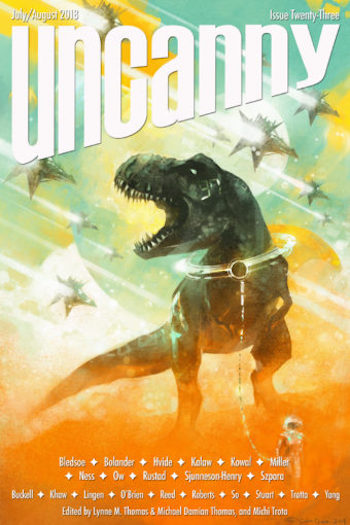
In “The Tale of the Three Beautiful Raptor Sisters, and the Prince Who Was Made of Meat,” Brooke Bolander does one of those wonderful things that turn a reader’s brain into happy fizzy cola: they took a fairy story full of princes and dark woods and oppressed peasants and dropped a pack of raptors into it. And it could have been a fun fairy tale riff, a feminist tale, a jab at the type of mindless, cruel power so many of us are subject to. But what’s even better is that Bolander didn’t just shove some dinosaurs into a fairy tale for weirdness’ sake—they created a fictional raptor babysitter, with a batch of babies who need entertaining. Which means we get lovely details like the concepts of happiness and warmth summed up as “happier than liver and shrieks and the final pounce, warmer than blood and sun-drenched stone” and terms of endearment like “love of my gizzard” and every poor dopey mammal is described as “soft-bellied” or “plump” or “arthritic”, because this is a predator, lulling baby predators to sleep.
And absolute best of all? Reader, they have feathers.
–Leah Schnelbach
“A Witch’s Guide to Escape: A Practical Compendium of Portal Fantasies”—Alix E. Harrow (Apex Magazine)
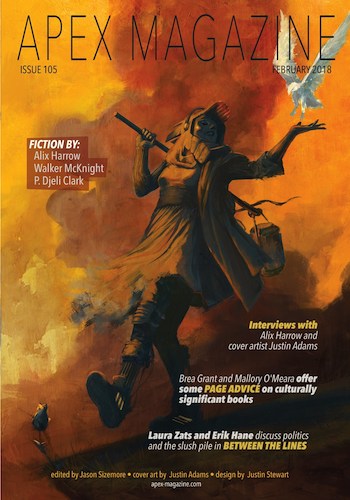
Alix E. Harrow’s story pushes the reader’s emotional buttons, given that it focuses on the literal magic of books. Set in a library in rural Kentucky and ultimately dealing with a witch-librarian’s calling to give the right person the right book above the rules for preserving the safety of her order, it was more or less designed to have me tearing up from first to last (which it did). The attention to race and class in the context of libraries, social work, and Southern-Appalachian life comes through in a handful of small but carefully observed details that spoke to a wealth of lived experience I appreciated seeing.
–Lee Mandelo










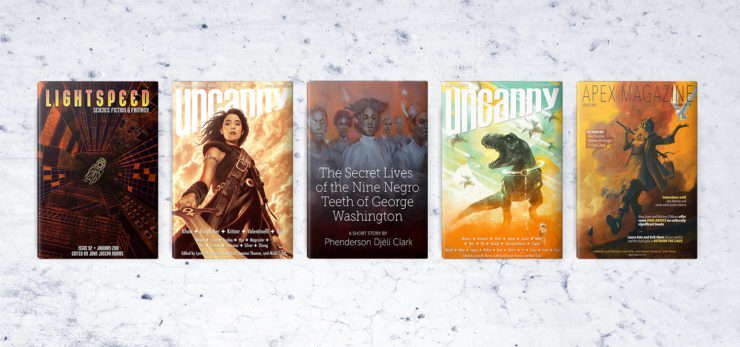
Congrats to Space unicorns and other finalist and magazines.
I for one had a very difficult time ranking my top three in this category.
Damn.
Links, for those who haven’t yet read the stories and would like to:
“The Court Magician”—Sarah Pinsker (Lightspeed)
“The Rose MacGregor Drinking and Admiration Society”—T. Kingfisher (Uncanny Magazine)
“The Secret Lives of the Nine Negro Teeth of George Washington”—P. Djèlí Clark (Fireside Magazine)
“STET”—Sarah Gailey (Fireside Magazine)
“The Tale of the Three Beautiful Raptor Sisters, and the Prince Who Was Made of Meat”—Brooke Bolander (Uncanny Magazine)
“A Witch’s Guide to Escape: A Practical Compendium of Portal Fantasies”—Alix E. Harrow (Apex Magazine)
Thank you so much martey, for the links!
Secret life of the nine negro teeth is by far the best story here. Original and thought provoking, learned some history.
Runner up Tale of the three beautiful raptor sisters, surprisingly to me, since I hadn’t liked the few Bolander stories I’ve read, but this was an engaging fantasy.
third is Rose MacGregor- fun story
Fourth-Stet. Don’t really like stories in this style.
fifth- Court Magician, intriguing, but left me cold.
sixth -Witches guide, a bit too sappy, found the librarians interest in the boy a bit creepy.